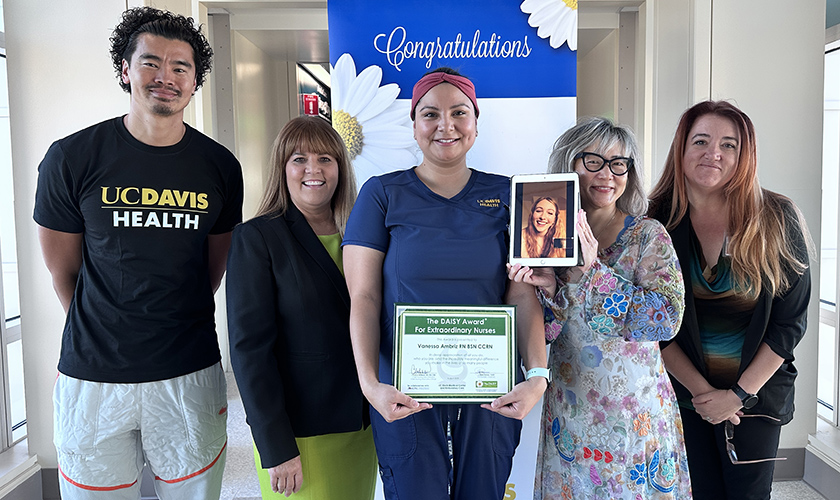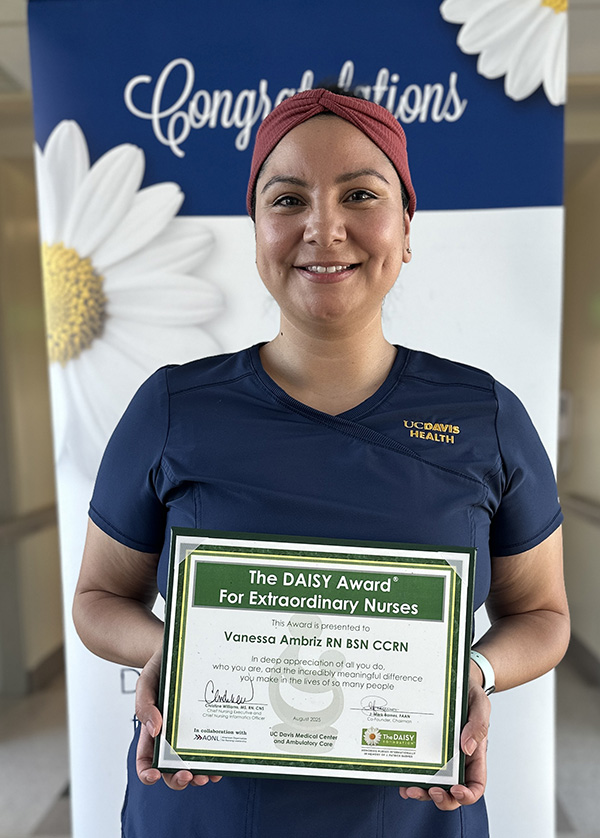DAISY Award—Vanessa Lluvia Ambriz

Vanessa Lluvia Ambriz
Tower 7 MSICU Gold
Nominator: Kenzie A Grinsell
I would like to nominate Vanessa Ambriz for a Daisy for her work with a Hispanic family and the importance of cultural humility, building relationships and upholding the dignity of our patients. Ultimately, this Daisy nomination shows the importance of walking in purpose. While 40% of all Californians are Hispanic, only 9.6% of nurses identify as Hispanic. A diverse population of healthcare providers can provide solutions for language and communication barriers, promote adherence to different cultural practices as well as dignity of patients and their families, and ultimately safe quality care. According to literature, Spanish speaking and African American families may be less empowered to ask questions during family centered rounds in the inpatient setting compared with English speaking and white families.
 Because Vanessa is a Hispanic nurse, she was able to directly influence the care of her patient and the patient's mother who was the primary caregiver to her son (the patient) with severe chronic illnesses. Because she was Spanish speaking and Hispanic, she was able to understand the cultural nuances, build trust, empower the mother and bridge issues related to communication.
Because Vanessa is a Hispanic nurse, she was able to directly influence the care of her patient and the patient's mother who was the primary caregiver to her son (the patient) with severe chronic illnesses. Because she was Spanish speaking and Hispanic, she was able to understand the cultural nuances, build trust, empower the mother and bridge issues related to communication.
Vanessa started caring for a 19 year old male . He had many chronic illnesses including cerebral palsy, chronic kidney disease stage one, Lissencephaly, Lennox Gastaut Syndrome, global developmental delay, chronic lung disease, and gastric tube dependence. He presented to the emergency room and was admitted for an upper respiratory infection. On admission, his heart rate was in the 150s , febrile and had been placed on high flow nasal cannula for his increased work of breathing and increased oxygen demand. Unfortunately, he had been admitted to the pediatric unit at UCDH a few months prior. At that time, he was tachycardic in the 140s with increased work of breathing per mother of child (MOC). Per MOC, he had a chronic cough at baseline and a culture from his most recent bronchoscopy grew pseudomonas. During that admission, he was prescribed antibiotics and sent home; however, the MOC stated that the antibiotics did not help.
Vanessa was the primary nurse upon admission and asked MOC to give us a few minutes to connect him to our monitor and settle him before she entered the room. She took the time to make sure the sleeper chair had been prepared for the MOC since they had spent the majority of the day in the emergency room. When his mom entered the room, she seemed grateful for how comfortable her son looked. However, as mom was arranging the room with his belongings Vanessa started to notice that the mom was upset. She assumed she was upset because the plan of care had not fully been established, so Vanessa started to speak to her in Spanish. Because Vanessa could speak the mom’s primary language, the mom instantly began sharing her experience of healthcare for her son. She shared that she felt her son had been misdiagnosed during his prior hospitalization, and that the outpatient physician did not take her concerns seriously. She expressed that because the doctor did not listen to her concerns, there was a delay in care that caused him to be hospitalized again. Vanessa took the time to explain to the mom that while her son was in the hospital, Vanessa would advocate for him and his mom so that her concerns would be heard. Vanessa reassured the mom that she would be a part of the conversation in the plan of care. When PICU rounds began, Vanessa made sure the mom was involved and that she had the opportunity to ask questions and get the answers she needed.
Unfortunately he became more unstable throughout the night and ultimately required intubation. Being a witness to an intubation can be distressing, especially to a parent, so Vanessa made sure that mom was a part of the entire process. She explained everything twice, both in English and in Spanish. Vanessa made herself available and approachable so the mom could ask questions. The mom’s concern and love for her son was apparent and Vanessa could sense how helpless the mother felt. At this point, it was clear that he was in severe ARDS and overall was not doing better on the ventilator. When Vanessa returned the next night, the team discussed intubation and proning.
Although a decision had not been made by the team whether to continue the current plan or if it would be best to paralyze and prone the patient, it was clear that he was in severe ARDS. As an ICU nurse, Vanessa prepared the necessary supplies and equipment that would be required for paralyzing and proning. That night during rounds the PICU attending ultimately decided to paralyze and prone him. All the changes, the ongoing decline of her son, and the inability to help had to be terrifying for the mom. Proning a patient is challenging at best, especially when the patient is unstable. It is a team effort led by the MD who is coordinating all of the movements, the nurse who is watching the vital signs, securing all the lines, positioning the patient so that it does not cause deep tissue injuries, the RT who constantly monitors the ETT, airway and ventilator, and the Lift Team who change the position of the patient in the safest way possible. There is always a risk to the patient who may decompensate, lose his oxygenation or airway, become hemodynamically unstable or develop a pneumothorax. The time immediately after the proning is critical and needs to be managed with utmost care. As a team proceeded with care, Vanessa made sure the mom had all the information in her language in a way that she could understand. Due to the capacity of the room she was not able to stay at the bedside; however she stood outside the door so she did not feel completely excluded.
Once he was prone, the team immediately started to see major improvement in his vital signs. He spent many days paralyzed and prone before he was well enough to remain supine. Although he was doing better, the effects of infection on his lungs ultimately required a tracheostomy. This was also new to the mom. Vanessa spent most of the night talking to the mom about why a tracheostomy was the best treatment option and how this would affect his care at home. Because Vanessa had developed a trusting relationship with the mom and had the ability to speak Spanish, Vanessa was able to answer all mother’s questions and alleviate her concerns. Within a few hours after their talk, the mom gave her consent. Following trach placement, the mom studied and learned from the trach team how to care for her son. Although Vanessa could not be there, as his primary nurse, Vanessa made sure there was an interpreter helping mom every step of the way. Vanessa along with the other nurses reinforced the mom’s learning and soon the mom was confident and able to do all of the care by herself.
In addition to the education provided, Vanessa made sure mom worked with every RT that worked with her son. Vanessa was able to advocate for the mom so that she felt comfortable enough to ask questions. Vanessa was also there to translate the answers for her. By advocating and building a trusting relationship, Vanessa created a safe environment for the mom and her child. The mom found her voice and began asking her own questions without being prompted.
By the end of his hospitalization, his mom had all the knowledge, tools and resources she needed to take her son home. She thanked Vanessa for checking in and making sure her needs were always taken care of. The mom told Vanessa that her attentiveness, real time education and mostly the advocacy gave the mom the confidence she needed to advocate for her son outside of MSICU Gold and in the outpatient setting. This example shows the difference one nurse can make to the whole family, and not just the patient. Vanessa experienced a deeply personal patient experience that reveals of the importance of cultural humility, building trust and upholding dignity. The outcome could have been vastly different had the mom still had anger, disappointment and fear of healthcare providers. I think about that frequently, even now after he was successfully discharged.
I realize there is power in one, the power of one nurse who cares. I realize the importance of why healthcare needs more Hispanic nurses to care for the 40% of Hispanics in California. While we cannot change everything, we can change the lives of the patients we care for and that is reason enough to care with cultural humility, building trust and upholding dignity. Utilizing the tenets of cultural humility was foundational for the patient-centered care, quality and outcomes for this family. Although we will never truly understand what his mom has gone through, we knew she loved her child deeply. I know that Vanessa’s loving care for the patient and his mother had long lasting impacts to their future outcome. Because of Vanessa’s commitment to her purpose of serving others, her language skills with cultural background and her strong sense of cultural humility, she made a difference. For this reason, I am nominating her for a Daisy.


